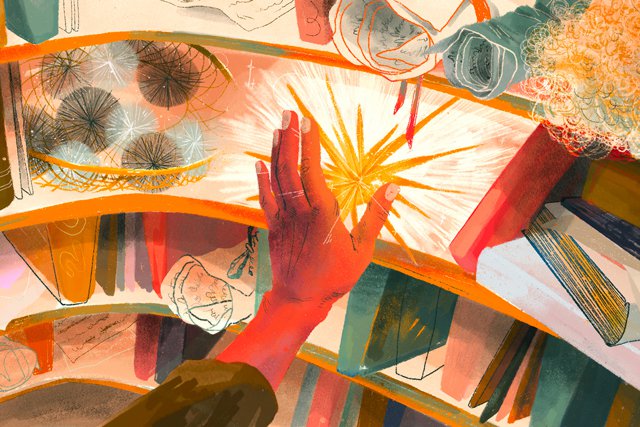
As a child, I heard stories of war, of family separation, of treks across mountains with nothing more than hope and determination in hungry stomachs. I heard tales of hands sweeping away flies that hovered over moldy soup that was discovered and desperately devoured. I heard stories of traveling across the Atlantic Ocean on a ship that stored ostrich eggs as food for all the passengers — though I’m guessing that last one may not be exactly true.
Stories define us. They make us who we are, and they are the essence of how we understand our families, our neighbors and our friends. You might think of “storytellers” as creative types who make a career out of such expression, but they aren’t the only ones. People have been telling stories since the time they first painted art on cave walls, and surely before. It’s what humans do. We connect to each other through the stories we tell — both true and imagined — and we empathize with each other by understanding these tales.
My professional life is focused on storytelling. For the past decade, I’ve spent my days deep in imaginary tales as an independent editor of fiction and traveled deep into the weeds of my own words as a nonfiction author focused on empowering the writers and storytellers of the world.
And you know what? 2020 has been a year full of stories. Not just on my desk, not just for the creatives, but for each and every one of us.
We all have a story to share. Right now, you are living through a story in your life that I’m guessing you’ll never forget. How will you preserve it? How will you take an extra moment to truly listen to the stories of friends, neighbors and others in your community to understand this moment in the world?
Creative pioneer Laurie Anderson has said, “Technology is the campfire around which we tell our stories,” and in 2020, this idea seems truer than ever. We Zoom. We FaceTime. We Skype. We connect on Google Meet and countless other apps that we may or may not have ever used before. Amazing organizations, such as Richmond’s own James River Writers, have captured the possibilities of technology to enable more storytellers, no matter who they might be, to find their voices and their paths toward being heard. They’ve moved much of their powerful programming online, from their monthly “Writing Show” panels to their Master Classes and “Writers’ Wednesday” social meetups.
I’ve created my own journal-writing series called “Write It Down.” My weekly videos, which began in mid-March, share prompts to help you capture your story in this moment, whether you’ve been journaling your whole life, you haven’t kept a diary since you were a child or you’ve never before captured your life on the page.
Both The Valentine and the Virginia Museum of History & Culture are seeking your stories, recognizing the necessity of capturing all of our days’ most subtle details before they are lost and forgotten. The Valentine is calling on Richmond students to submit their writing and art to “tell future generations about how life in the Richmond region changed during the spring of 2020.” Likewise, VMHC is accepting digital submissions from all Virginians, including stories, original images, audio or video recordings, and more. They note, “Experiences relating to changes in daily life, work and family needs, and the role of the health care and first responder community will be of particular interest.”
The ancient Greek historian Herodotus is known as the “Father of History” simply because he was among the earliest of storytellers. He captured the events of his day and preserved them not only for his community but also for the future. In fact, moments from the 2007 film “300” were taken directly from his accounts. As we take in his stories, we are able to connect with the Spartan king and his people. We feel we understand them, and we find ourselves cheering them on as they go into battle undaunted.
Today, our stories might seem less dramatic, but they are equally valuable. We have unique stories about jobs that have changed, family members together or apart, and day-to-day living within a smaller geographic radius than ever. We have stories of face masks and conversations held across streets or through windows. We have tales in common about moments of jubilation over finding a loaf of bread, disinfectant wipes or a package of toilet paper, a joy we never would have guessed at only months ago. There are struggles, happy surprises and profound sadness.
What is coming to mind for you about your life in 2020 so far?
It’s a time to open our eyes and open our ears, because no matter where that community campfire exists — outside a cave tens of thousands of years ago or virtually on a video call last weekend — we are built for stories. They capture the essence of humanity, who we have been in the past, who we are in this moment and who we will become.
Are you sharing your story? And are you listening? The tall tale about ostrich eggs at the grocery store is entirely up to you.
Local author and editor Kris Spisak wrote her first book, “Get a Grip on Your Grammar: 250 Writing and Editing Reminders for the Curious or Confused” (Career Press, 2017), with a goal of helping writers of all kinds sharpen their craft and empower their communications. Her “Grammartopia” events follow the same mission, as does her latest book, “The Novel Editing Workbook: 105 Tricks and Tips for Revising Your Fiction Manuscript” (Davro Press, 2020).
"story" - Google News
June 21, 2020 at 05:30PM
https://ift.tt/3hQthKP
Sunday Story: Capturing Your Story - richmondmagazine.com - Richmond magazine
"story" - Google News
https://ift.tt/2YrOfIK
https://ift.tt/2xwebYA
Bagikan Berita Ini














0 Response to "Sunday Story: Capturing Your Story - richmondmagazine.com - Richmond magazine"
Post a Comment